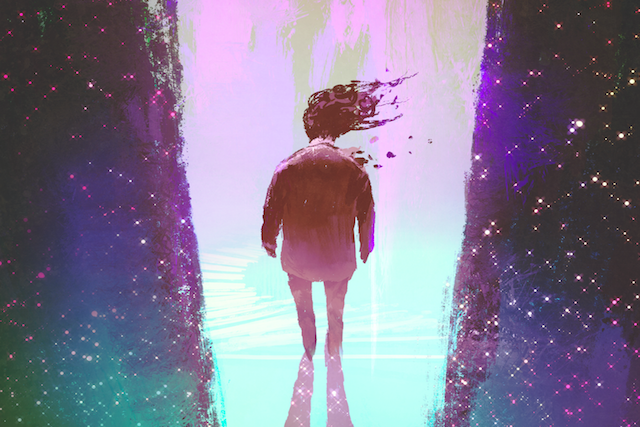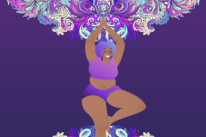
“Life is 10% what happens to you and 90% how you react to it.” ~Charles R. Swindoll
When I read this for the first time, I realized I didn’t have to define myself by my circumstances. That was huge for me, because my circumstances felt pretty shameful.
It was around midnight and I was curled up in the fetal position, mostly alone in my 7’x7’ dorm-style Manhattan apartment. It was me, countless bed bugs, dozens of cockroaches, three bottles of liquor, two packs of cigarettes, and one overwhelming mind.
I’d always felt drawn to New York City, largely because I grew up doing theater, but that’s not what eventually brought me there. For more than a decade before that move, I’d lived a life defined by starving, binging, drinking, fighting, and a persistent need to numb myself.
All my relationships revolved around my sadness, partly because I saw pity as a form of love, and partly because I didn’t know who I was beyond my victim stories.
I’d blamed other people for everything that hurt in my life, and in the process hurt other people. After that, it felt best to move away and keep to myself. It was safer that way—for everyone.
I felt stuck in every way possible—stuck in my fearful isolation; stuck professionally, since I had a degree in acting and writing, but no confidence to pursue either; and stuck in a dangerous week-to-week living situation because I couldn’t afford anything better.
Worse, I felt convinced I deserved the life I created. And I wasn’t sure it was worth the effort to work toward something better. If the past were any indication, I’d find a way to mess it up.
Depressed, despondent, and dramatically reclusive, I couldn’t foresee a future that didn’t involve self-loathing and self-destruction.
Then I found that quote: “Life is 10% what happens to you and 90% how you respond to it.”
When I read that, something shifted inside me.
I realized I’d lived my whole life responding with anger to things that happened when I was young, and feeling ashamed of that. I considered that maybe I could respond better from that point onward and feel proud of myself for doing it.
Maybe my life wasn’t the sum of my hurts and mistakes. Maybe instead of judging myself for where I’d been and feeling down on myself for where I stood right then, I could empower myself to create something different from that moment forward.
Maybe all that really mattered was the choice I made right then.
I didn’t make any major changes in the following months, but I did make one big commitment: I found a nearby yoga studio where I could volunteer behind the desk in exchange for free classes.
Suddenly, I had a reason to smile—and I don’t mean an experience that brought me joy (although it was that). My smiling face was the last thing people saw before they entered the studio to take care of their minds and bodies.
In some small way, I was part of something positive, and I felt good about that. I also felt good about coming to my mat day in and day out, no matter what else had happened.
Now I was piling up tiny reasons to feel proud. It might not have been a huge, dramatic change, but it was definitely big.
Those reasons snowballed into others—quitting smoking, writing a series of personal essays, finding a low-income efficiency studio to sublet, and eventually, securing a travel job that took me away from NYC after two-and-a-half years of stumbling and growing.
Though I’ve since transformed my external world by moving to California, falling in love, and starting this website, those changes aren’t the result of waking up in one moment and doing everything differently ever after.
Those changes are the result of changing my inner monologue from, “Why did I make such bad choices?” to “What’s the best choice I can make now?”
The biggest difference between me now and me then is that I no longer sit alone in shame, compounding negative feelings with self-judgment, which only keeps me feeling stuck.
I accept that I am human, and that a part of that is going through highs and lows. I know I will go through tough times, and I know I can bounce back when I do, even if it takes a while.
I have learned that we are not powerless. It may not always seem like it, but we have a say in what happens—and when events seem beyond our control, we have a say in how we respond to them.
That’s all we can ever control, and that’s what really matters: the choice we make right now.
*This post is part of my first ever eCourse, launching today: Recreate Your Life Story: Change the Script and Be the Hero.
About Lori Deschene
Lori Deschene is the founder of Tiny Buddha. She started the site after struggling with depression, bulimia, c-PTSD, and toxic shame so she could recycle her former pain into something useful and inspire others to do the same. You can find her books, including Tiny Buddha’s Gratitude Journal and Tiny Buddha’s Worry Journal, here and learn more about her eCourse, Recreate Your Life Story, if you’re ready to transform your life and become the person you want to be.
- Web |
- More Posts













 Though I run this site, it is not mine. It's ours. It's not about me. It's about us. Your stories and your wisdom are just as meaningful as mine.
Though I run this site, it is not mine. It's ours. It's not about me. It's about us. Your stories and your wisdom are just as meaningful as mine.
I’m going to frame that quote somewhere. Thanks
You’re most welcome!
Thank you for this article, Lori! So often, people do no longer realize that they have a choice. Hope some of them will get to read this!
You’re most welcome. I hope so too!
i’ve just recently discovered tiny buddha. i love your articles, your honesty, and the way you encourage others to live their best life! thank you for your gift to the world!
Welcome to the site Valerie, and thanks so much. I’m glad you’ve enjoyed Tiny Buddha so far!
LOVE THIS!!! Yep, this is it!
Thanks so much Katie. =)
Wow – this was a great and very to-the-point post. I don’t think I’m alone when i say it speaks to me big time. I’ve shifted my life from feeling ashamed and sorry for myself and slowly my life has done a 180. I still struggle with how much I love my life now and whether i “deserve it”, but I am slowly smothering that voice and letting the one that says, “why not you?” come through. Great great post.
Thanks so much Emily. What a great question–why not you? That question and related ones have been very helpful for me lately, as I’ve been trying different things and seeing myself in new ways, in many cases going way outside my comfort zone. Instead of telling myself, “But that’s not who I am,” I’ve been asking myself, “Why couldn’t it be?” It’s definitely opening up my world!
I’m saving this article to re-read as often as I need to. Loved it!
Thanks Booker. I’m glad you enjoyed it!
Lori! – My jaw dropped and tears formed when I realized this story was you – idk why I was in shock, lol I guess it’s seeing the result of – small positive changes REALLY DO change your life for the better. You really are a product of what you preach and reading this story from you makes this site feel so much more alive! I feel so connected and can relate SO MUCH with everybody who shares their story.
I love love love reading Tiny Buddha everyday – and I truly cannot wait everyday for your email — It is by far my fav fav fav email I get!!
Thanks so much for creating Tiny Buddha — you are helping so many people in big ways!!
peace and love =)
You are most welcome, and thank you for being part of Tiny Buddha! I also feel so connected to everyone who shares their stories here. It’s a comforting feeling to realize we are all so similar, and we are never alone. Peace and love back to you. =)
So inspiring. Thank you very much!
You’re most welcome!
Lori, your words flow beautifully as a brilliant affirmation that WE are HUMAN.
I so appreciate the reminder that we are all in this together and that we always have control over how we choose to respond…our response-ability is the only thing we control.
My fave lines: Those changes are the result of changing my inner monologue from, “Why did I make such bad choices?” to “What’s the best choice I can make now?”
What a centering reminder for all of us who {in the past!} have let fear induce a desperate grasping at control in this life.
I’m focusing on the power of SURRENDER and at the same time, feeling EMPOWERED to choose my thoughts and responses…that’s where it’s at.
What we attend to grows. When we attend to pure potentiality and consciously choose our thoughts, ease & happiness flow…
Thank you for shining YOUR light in the world, Lori!
Thank you Denise! I love what you wrote about surrendering and feeling empowered. I think it’s easy to associate grasping for control with taking responsibility. I know I’ve certainly made that mistake! “Let go” has been my most empowering mantra because it reminds me to do what I can and then be at peace with what will be.
I think it is really easy to connect with your work because of your honestly in the message Lori. Many people like myself have experienced similar depressive lows and are on their way through to trials of pain right now. By writing down your ability to rise above these dark places in a honest fashion allows hope to run through the minds of your readers!
Thank you for this great post!
Thanks so much, and you’re most welcome. It means a lot to me to know that my writing provides hope. How is everything going with you now?
Good thank you! I hope that I might be close to the point you were a couple years ago with your site with growthguided.com. Lots to learn, but tones of passion and creativity to express for the readers to come =) You are a big inspiration and guide for me and my site!
Thanks so much! That’s wonderful, that I’ve inspired you. 🙂
Awesome Lori! Thanks for sharing so authentically. Love this…
Those changes are the result of changing my inner monologue from, “Why did I make such bad choices?” to “What’s the best choice I can make now?”
Powerful.
Bernadette 🙂
You’re most welcome, and thanks so much. =)
Thanks for sharing your inspirational story and showing us how to deal with an “overwhelming mind” in a positive way. I love how you made the mental shift from thinking about choices you made in the past to thinking about the best choices for you right now.
You’re most welcome, and thank you so much. =)
Really needed to hear this today as I have lost my temping job, due to me saying the wrong thing on my blog. I wasnt happy there and know there is something better out there I just have to find it. This quote has given me some much needed reassurance. Thank You.
You’re most welcome. I’m sorry to hear about your temp job, but glad you have some clarity about it not being right for you. I remember when I was volunteering at that yoga studio. One day I told the owner (who I got friendly with) that it frustrated with me that I had no idea what I wanted to do. She told me that I had an idea of what I DIDN’T want, and that was progress. So here’s to progress. =)
I wish it were this easy. Every day I find myself wound tightly in a web of negativity, lack of self worth and insecurity. Changing your state of mind works for a a small amount of time but what about the long run. How do you keep yourself from getting caught up in that web again? You can make a choice to be happy or to let go, but how can you control the overwhelming feeling of worthlessness and hopelessness? How?
I think I know what you mean JM. it’s not easy–it wasn’t (and isn’t) for me. I spent most of my life fully believing I was fundamentally bad, unlovable, and worthless.
There wasn’t one moment when I fully let go of those beliefs. But I learned at one point that we hold onto beliefs like this because we’re programmed to continually seek and (therefore find) evidence that supports them. So if we believe we’re worthless, we’ll translate everything that happens as proof.
Why doesn’t she like me? I’m worthless. Why didn’t I get that job? I’m worthless. Why doesn’t my life feeling meaningful? I’m worthless.
I know how that record can play over and over!
If we want to start believing something different, we have to look for evidence to support the opposite beliefs, and change the stories we tell ourselves.
Why doesn’t she like me? Because not everyone likes everyone–it’s about her, not me. Other people like me because I’m a valuable person. Why didn’t I get that job? Because there were lots of excellent candidates, but there will be other opportunities for me, just like there have been opportunities in the past, because I’m a valuable person. Why doesn’t my life feel meaningful? Because I’ve yet to identify what’s meaningful to me. But I trust I’ll find it, and make a difference in the world when i do, because I’m a valuable person.
It can take a while to start doing this instinctively–and I’ll admit, I still go to a negative place in my head sometimes, but I work at it, and it’s gotten easier with time. I think that’s the best we can do–work at it, and have patience with ourselves.
The good news is that once we start changing our stories, and translating things as proof to support healthier beliefs, we put ourselves in a better place to actually create more proof.
When you tell yourself you’re valuable, you’re more apt to do something with your time that feels valuable.
So that’s my advice. Start recognizing when you translate events in your life as proof of those negative beliefs, and try to change those stories. If you can change your stories, you can change your life–one thought, one action, one tiny step at a time.
I hope this helps a little!
Lori
Thank you Lori. Currently I feel like I’m in the situation you described above…’Stuck’. I recently graduated from college and it’s hard to get a job in my field right now…it’s been quite depressing and some bad things have happened along my journey…It makes sense to do what you can ‘right now’ instead of focusing on what mistakes were made in the past. I do that a lot, blame/scold myself.
You’re most welcome Gidget. What is your field, and what kind of job have you been looking for?
Beautiful Lori. Just beautiful. Love & Courage
Thanks so much Stephen. 🙂
Fantastic post!!! Thank you for always being so open, and sharing yourself with the world. You have so much amazing insight to share from all of your lessons learned! 🙂 I love when you said…”Those changes are the result of changing my inner monologue from,
“Why did I make such bad choices?” to “What’s the best choice I can make
now?” ” -Awesome!!!! 🙂
Thank you so much! It’s a nice feeling to be able to reflect back on hard times and share lessons that may be useful to others. I’m grateful for the opportunity to do it. 🙂
Thank you. I Needed to see this today so badly. I was beating myself up over not being where I wanted to be at this point in my life. The feeling that I was “behind” where I should be and didn’t have enough time to do everything I want to do because I have wasted so much time figuring out my path. Then someone told me something similar to what you have written. And then I read this passage. Change your inner monologue from “why did I make such bad choices” to “what is the best choice I can make right now” is the best advice for me right now.
You’re most welcome. I know that behind feeling all too well. I’m glad this was helpful to you. =)
This piece is just beautiful – sometimes the 10% can be very influential. Thank you.
Thank you so much, and you’re most welcome!
This is a beautiful article. Over the last few years, I have been dealing with a roller coaster of anxiety and depression, and it’s just now in my life that I’m starting to take control of how I feel. I’ve started doing yoga and meditation, and it’s a lifesaver. This article helps to renew my faith that life doesn’t have to be so hard.
Thanks Maria. I’m glad you enjoyed it. It’s amazing how even just a tiny bit of time meditation can make a huge difference.
Thank you for your honesty in this post. When looking at this beautiful site, its easy to assume things were always this way. Thanks for the hope!! : )
You’re most welcome. Thank you for reading and taking the time to write. =)
It gv me a lot
It would be a shame if I didn’t take a moment to thank you from the bottom of my heart for sharing your inspiring story as it was, with words straight from the very depths of your heart. I am so glad that you came out of that experience stronger and wiser than you were before. I have been following your brilliant quotes on your facebook page nearly everyday for the past two weeks, since I discovered Tiny Buddha by some pure luck. However, I didn’t have the slightest idea that there was someone “exceedingly” warmhearted like you behind all these, who gave life to Tiny Buddha in the first place. Lori, you are simply amazing and you are making a difference in ways you don’t even realize 🙂 Your story has touched me deeply. That said, the truthfulness of it has won you another fan who is more or less on the same journey as you and others here. As you put it so profoundly in one of your cordial responses below, it is indeed comforting to know that we are all so similar and we are never alone on this journey called life. The more I read your writings, the more convinced I become of the fact that you are beautiful on the inside as you are on the outside. Wish you all the best&Sending positive thoughts your way to brighten your day.Take care please.
Hi Robert. Thanks so much for taking the time to write–and what a wonderful comment to read. =)
It’s been such a rewarding experience to open myself up here and connect with others who are willing to do the same.
I remember there was a time when I felt so completely different and separate. If you’d have told me then that just being honest would make such a huge difference, I wouldn’t have believed it. But I am reminded again and again, both when I share and when other writers and readers do, that this is true.
Sending positive thoughts back to you!
Lori